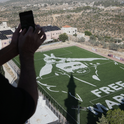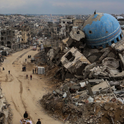The deaths of hundreds of innocent civilians during Israel’s brutal winter 2008-2009 offensive in Hamas-run Gaza sparked outrage across the world. Yet to the surprise of all—including the Israeli security establishment—the West Bank did not explode in violent protest against the war. After 40 years of occupation it seemed as if many West Bankers had finally lost faith in violent resistance.
They may have lost faith in peaceful negotiation too, no longer believing that the international community is serious about getting Israel to lift the yoke, while still wary of anything that could result in yet more retribution at the hands of Israel’s army. The peace process seems deadlocked. President Abbas was keenly aware of this at the Fatah party conference in early August. “Although peace is our choice, we reserve the right to resistance,” he said.
Yet despite the widely felt pessimism, there is grounds for some hope. Part of the reason the West Bank didn’t dissolve into anarchy during the Gaza conflict was the little noticed improvement of its own security forces. Just two years ago, towns like Nablus, Jenin and Hebron had a “wild west” feel to them. But in 2007 Palestinian prime minister Salam Fayyad ordered a clampdown on gangs and illegal militias. Today, those cities are much safer. Children can go to school unaccompanied, and cars stop at traffic lights.
There is, of course, a strategic objective behind this: improving security helps economic growth in the West Bank, which in turn encourages the all-important moderate Palestinian voice. In the long term, better security should also help the Palestinian Authority to secure its own territory and to ready it for full statehood.
These efforts have been aided since 2005 by a US-led mission, headed by a US general—Keith Dayton—with British and Canadian support. I have spent the past 15 months involved in this bottom-up approach, helping to transform the Arafat-era hotchpotch of security forces. We have provided professional advice, training and non-lethal equipment to many key areas of the security forces, excluding the intelligence services. At my suggestion, we have set up a senior leaders’ course—a sort of high-level Palestinian staff college—helping the Palestinians to establish a core of effective leaders, imbued with the values of human rights, good governance, accountability and the rule of law. Some of the graduates are now in key positions and are keen to reform their own forces.
But the security plan’s success also puts the Palestinian Authority in a difficult position. Without more visible Israeli efforts to make life tolerable, the Authority’s forces are seen as Israeli stooges, keeping their own people oppressed. Meanwhile, Hamas shouts that anything other than armed resistance amounts to collaboration.
The problem is that, despite Tel Aviv’s assurances that “as the Palestinians do more, we will do less,” Israeli security architecture in the West Bank is as strong as ever. Some concessions have been made—a few checkpoints have gone, working conditions for the security forces are a little easier. But these forces generally remain under curfew after midnight and cannot operate in most rural areas without Israeli permission. Cities like Nablus have enjoyed some economic growth in the past few years, but there are still over 600 checkpoints and other obstacles to movement choking the West Bank’s economy—and the security fence, in places twice as high as the Berlin Wall. Israel argues that such measures are essential to protect its citizens against attacks. Yet the awkward truth is that Israeli settlers in the West Bank are well represented in the new coalition of Prime Minister Netanyahu, and they want a continuing, strong Israeli security presence. Their political power is now a logjam in the peace process.
Ironically, then, we can infer that neither side wants to draw too much attention to the West Bank’s law and order improvements: the Israeli government because of the political cost of offering the Palestinians significant concessions, and the Palestinian security forces because they don’t want to be seen as Israel’s helpers. So the situation remains fragile—even explosive—despite valuable efforts at the grassroots level.
What needs to happen now? President Obama has already begun the challenging work of trying to persuade Netanyahu to clamp down on illegal settlements and come to an agreement with the Palestinians on other major issues. But to succeed he needs to expand his audience, speaking not just to the leaders but directly to the people of each side, Palestinians and Israelis. Meanwhile, the Palestinian Authority must continue working to improve security and living standards, and do more to persuade its people that its work is for Palestinian, not Israeli, benefit.
Without these efforts and concomitant Israeli concessions, the siren voices of Hamas will get louder, making it more difficult for Abbas and the moderate Palestinians to defend a peaceful route to Palestinian statehood. Conversely, real progress towards a solution can help to undermine Hamas. Israelis and Palestinians at all levels face a choice. Choose wrongly, or do nothing—and sideline the moderates—and it is hard to see how the excellent work done by Palestinians, and outsiders such as Dayton and his team, will be able to continue.

The West Bank shapes up
The Palestinian Authority has quietly been getting its act together. Now Israel must too
August 27, 2009











